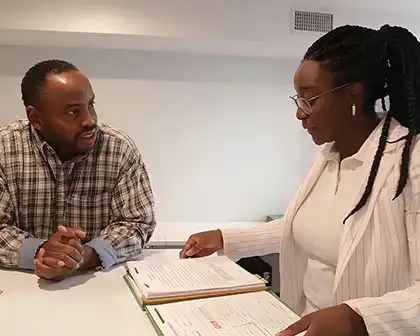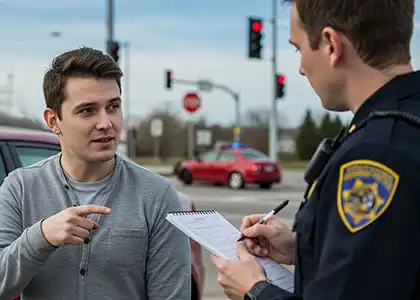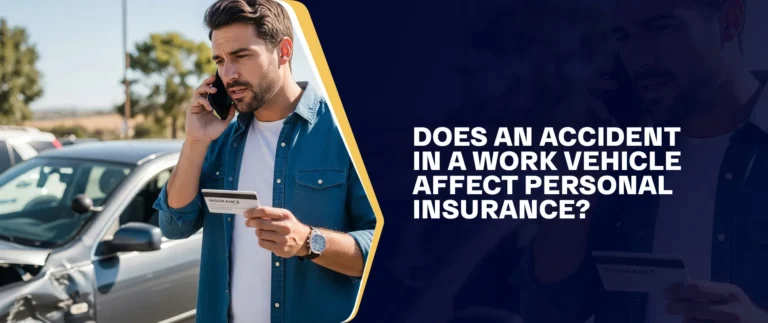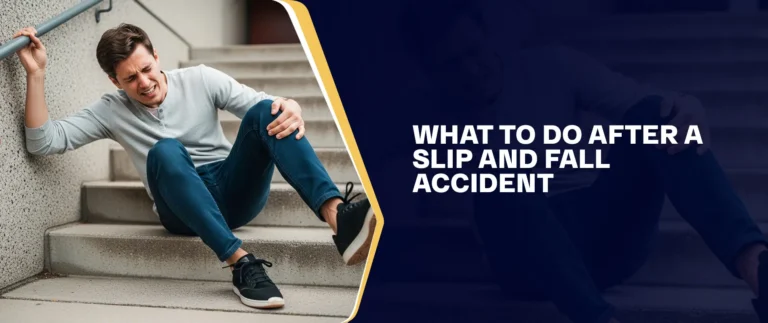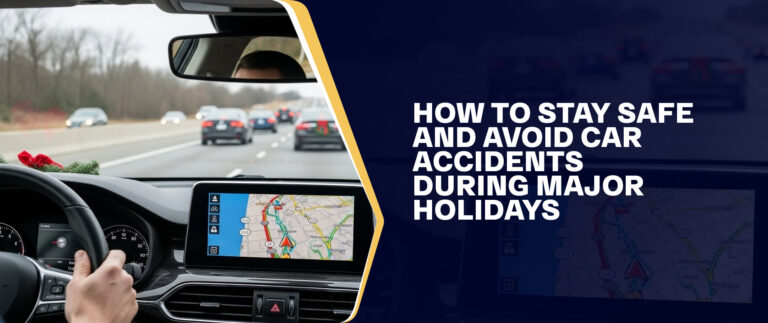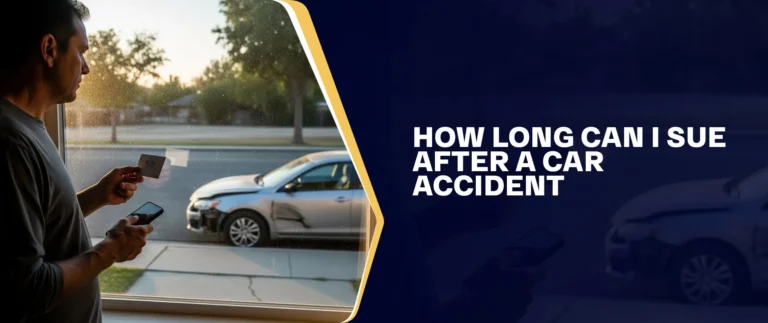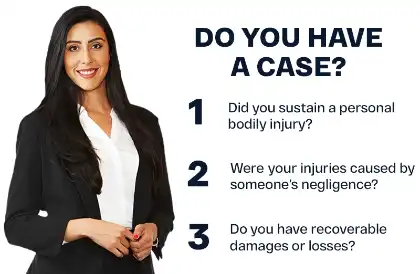TL;DR: If police blame you for an accident, get the report, check it for errors, and collect evidence to challenge it. Police reports are not legally binding, but insurers use them to decide fault. Contact the officer, submit a supplemental statement, and have an accident lawyer for legal advice.
Table of Contents
If the police say you’re at fault for a crash, you can challenge the report by identifying errors and presenting evidence that supports your account of the incident. Police reports are not legally binding; they serve as supporting evidence but do not determine liability on their own.
To understand your rights and pursue a fair outcome, it’s critical to act promptly, review the report carefully, and consult with an accident attorney. At Arash Law, we assist individuals who have been injured in disputing inaccurate police reports and pursuing compensation for their losses. For a complimentary initial consultation, call us at (888) 488-1391.
Possible steps to take if the police assign fault to you:
- Obtain a copy of the police report.
- Review the report for accuracy.
- Collect evidence to support your claim.
- Contact the officer to request a correction.
- If necessary, submit a supplemental statement.
- Consult with a personal injury lawyer to challenge the report.
Can I Dispute A Police Report If I’m Blamed For An Accident?
It is possible to dispute a police report. Although these reports serve as important evidence, they do not represent final judgments. You have the right to challenge inaccurate or misleading information.
To prove that you didn’t cause an accident, you can gather evidence that supports your version of events. Next, write a detailed account of what happened and submit it to the police department. Your report should include any inconsistencies and a request to review your case. Here are the things you should do if the police blame you for the crash:
Step 1: Request A Copy Of The Police Report
There are several ways to obtain a police report in California. It includes getting a copy in person or online through the department’s website. Ensure you have the report number or details, such as the accident time and location. Once you receive it, go through the entire report. Look for discrepancies, such as:
- Errors in the dates.
- Incorrect times.
- Wrong locations.
- Biased or ambiguous language.
- Statements that falsely assign faults or omit critical details.
Pay attention to witness statements, as they may provide additional context. If you find errors, note them and gather evidence that may dispute them.
Step 2: Gather Evidence To Support Your Side
Collect documents, records, and any other relevant information that can back up your claims. It is possible to challenge the police report based on the following evidence:
- Photos of the accident and damage to the vehicle.
- Dashcam and traffic footage.
- Witness statements and contact information.
- Driver’s admission of fault, if any.
- Report of an accident reconstructionist, if available.
Further evidence may be necessary in California truck accidents, such as hours-of-service records, black box data, and other documentation that may show if certain federal laws were violated.
Step 3: Contact The Officer To Request A Correction
If you find errors or discrepancies in the police report, reach out to the officer who prepared it and request a correction. Be sure to clearly explain the issue and provide evidence that supports your version of events. Since some departments have strict timelines for making changes, it may be better to act quickly.
To streamline the process:
- Visit the police department’s website to locate the officer’s contact information.
- Call or email the officer with a polite, detailed explanation of the error.
- Share supporting documentation, such as photos or witness statements.
- If the officer declines to revise the report, consider submitting a written statement.
Step 4: Submit A Supplemental Statement
Most police departments allow individuals to submit a supplemental statement to include their version of events in the official report. This statement should clearly outline the discrepancies between the police report and the actual events. You must provide evidence or witnesses to support your version of the incident. To maintain credibility, ensure your statement is concise, factual, and free of emotional language.
Step 5: Speak With A Personal Injury Attorney
Disputing a police report alone can be overwhelming, especially if it contains serious errors that affect your claim. A personal injury lawyer can guide you through the process and help you clearly communicate your concerns to the officer or insurance company.
A lawyer for personal injury cases can also identify legal or factual mistakes and gather evidence to support your case. In some cases, they may work with experts like accident reconstructionists to support your claim.
A personal injury lawyer can help by:
- Reviewing the police report for errors or bias.
- Contacting the officer to request corrections.
- Submitting a supplemental statement on your behalf.
- Gathering evidence and expert opinions to support your claim.
- Advising you on whether to pursue legal action if the report remains unchanged.
With representation, you may have experienced legal support in disputing the fault. It is possible that your lawyer will be able to identify other potential liabilities. For instance, driver error in California car accidents occurs frequently, and evidence may exist to support this claim.
Are Police Reports Legally Binding?
No. Police reports are not legally binding. They are considered evidence, but not final decisions. If the report contains errors or biased language, you can still challenge it with other evidence, expert input, and legal representation.
Courts often weigh them alongside witness statements, physical evidence, and other documentation to determine liability. Ultimately, their role is supportive rather than definitive in legal proceedings.
What If The Police Are Wrong?
If police make an error, it’s crucial to understand your rights and how to deal with it.
If the officer is biased or refuses to correct the record, there are several actions you can take. Options include:
- Presenting your evidence.
- Filing a complaint.
- Seeking legal counsel.
Accident lawyers can escalate the issue internally by doing the following:
- File a formal complaint with the police department’s internal affairs division or civilian oversight board.
- Pursue alternative legal avenues, such as filing a lawsuit, if internal resolution fails.
- Seek assistance from state or federal agencies to address the misconduct.
Common Mistakes Found In The Police Reports
Police reports are valuable tools in accident claims, but they aren’t perfect. Here are some common mistakes:
- Factual Error
- Wrong name, contact info, or license plate.
- Incorrect vehicle details or crash location.
- Incorrect time or weather.
- Misleading Context
- No mention of road conditions, vehicle damage, or witness reports.
- Quotes taken out of context.
- Key facts are missing from the summary.
- Biased Language
- Words like “reckless” without proof.
- Statements that lean toward one version.
- Incomplete Investigation
- The officer relied only on one side.
- No witness input.
- Overlooked road signs or traffic laws.
If the officer shows bias or refuses to cooperate, you can proceed with the matter by filing a formal complaint with their supervisor or the relevant regulatory agency. It is advisable to include all documented evidence and details of the incident to support your case. Seek advice from an accident lawyer who can guide you in navigating this process.
How Accident Lawyers Can Help With Disputed Police Reports
Inaccurate police reports can affect your case. An accident attorney reviews this information closely for errors that could affect your case. In the event that the police unfairly blame you, we can:
- Review the report for factual or legal mistakes.
- Gather missing or overlooked evidence.
- Contact the officer to request corrections.
- Submit a formal statement with your version of events.
- Support your personal injury claim with input from expert witnesses.
Personal injury cases can be tricky, especially if there’s an error in the police report. If you’re wondering, “Do I need a personal injury lawyer if the police say I’m at fault?” it may be in your best interest to speak with one. A lawyer who handles accident cases can review the details, explain your options, and guide you on how to respond to the report and any resulting claims.
How Comparative Negligence Affects Your Claim
In California, being partially at fault does not bar you from seeking damages. However, the compensation you may be able to pursue may be reduced based on your percentage of fault. This legal doctrine is known as pure comparative negligence.
If your damages total $100,000 but you are 30% at fault, you may still be able to seek $70,000. Each party pays according to its share of responsibility. An accident lawyer can help you understand how the fault affects your case.
Common Questions About Police Blame In Accident Cases
It’s common to have questions when police reports seem inaccurate or unfair. Below are answers to frequently asked questions that may help clarify your next steps. For more guidance, contact Arash Law attorneys or complete our “Do I Have A Case?” form here for a free initial consultation.
How Much Does A Personal Injury Lawyer Cost In California?
Many personal injury attorneys work on a contingency fee basis, meaning you pay no attorney fees unless compensation is recovered, though recovery cannot be guaranteed. The rate depends on how complex your case is and whether it goes to trial.
Certain case-related costs may be charged separately regardless of the outcome. During the free initial consultation, accident lawyers will explain the payment structure so you will know exactly what to expect.
How Do I Know If The Police Hold Me Responsible For The Crash?
You usually find out that the police are blaming you for a traffic accident through one or more of the following:
- Police Report Findings — It may label you “at fault” or list a traffic violation.
- Citations or Tickets — You may receive a citation or ticket.
- Officer’s Statements — The officer may say you caused the accident.
- Insurance Company Reports — Your insurer may contact you about the findings in the report.
Drivers may not be the only ones facing blame. If you’re asking, “Can bicyclists be blamed for traffic accidents?” They could be, depending on the situation. It is possible for bicyclists to share responsibility for a collision if they exhibit reckless behavior.
If you sustained injuries in a collision, it may help to consult an accident lawyer. They can assist you with refuting the initial report, depending on the circumstances. To make this possible, credible pieces of evidence are necessary.
What Should I Do If The Police Blame Me For An Accident?
If the police blame you for an accident, you can take several key steps to uphold your rights. Correction may be possible, and you can still pursue compensation. You may still be able to challenge police reports. Here’s what you should do:
- Get a copy of the police report.
- Verify the accuracy of the report.
- Gather evidence to support your case.
- Contact the officer to request a correction.
- Submit a supplemental statement.
Consider consulting a personal injury lawyer if the insurance company refuses to reconsider the report. A lawyer can help you understand your case and discuss the options you have.
It is possible for accidents to happen in different ways, and other road users may share blame. For instance, there are bicyclists partly to blame for traffic accidents because they either get distracted or engage in other reckless behaviors. In such cases, an attorney handling reckless driving accident cases can investigate the circumstances of the collision to evaluate fault or shared liability.
Will Errors On The Police Report Affect My Accident Claim?
Yes. Errors in the police report can significantly affect your accident claim. Insurers rely on police reports to assign liability and fault in accidents. In court, police reports are important pieces of evidence. These documents provide credible insights into the details of a case.
It is vital to take action to address these errors. An accident lawyer may assist by:
- Challenging the report’s findings.
- Gathering additional evidence.
- Negotiating a comparative negligence settlement if this applies to your case.
Addressing these errors early may affect the outcome of your claim. Accident attorneys can also bring in experts or gather evidence to correct false assumptions. If you already have an attorney, they may offer you a free initial consultation that may help you in this situation.
How Long After A Car Accident Can I File An Accident Report In California?
If the crash involves bodily injury or death, you must report it to the California Highway Patrol (CHP) or local police within 24 hours. Additionally, report the incident to the Department of Motor Vehicles (DMV) within 10 days using an SR-1 report, regardless of how minor the injury may be or how much damage occurred. Car accident lawyers can also assist you in filing these reports.
How Do I File A Report With The DMV (SR-1)?
Here’s how you file a report with the DMV:
- Gather the following documents first.
- Your driver’s license.
- The vehicle’s insurance information.
- Your car’s license plate number or vehicle identification number (VIN).
- The other party’s vehicle and insurance information, if applicable.
- You must complete the SR-1 form and submit it to the California DMV. A Spanish version of this form is also available.
Reporting the accident to the DMV is necessary in cases where there is injury, death, or property damage exceeding $1,000. You must report the incident within 10 days.
This process can also be important in hit-and-run accidents. It may happen anywhere in California, including San Francisco. In such cases, San Francisco hit-and-run accident attorneys may be able to support you in exploring your legal options. They may be able to work with the authorities to determine the fleeing driver.
Don’t Let A Mistake In The Police Report Hurt Your Case
Disputing fault in a crash can be challenging. Our accident attorneys can help clients challenge unfair reports and pursue reasonable compensation in accordance with California law. We handle different types of cases, including those that involve:
- Motorcycle accidents
- Pedestrian incidents
- Bicycle collisions
- Slip-and-fall incidents
- Hit-and-run crashes
- Truck collisions
- Airbnb incidents
- Uber crashes
- Lyft collisions
- Workplace accidents
Call us at (888) 488-1391 or fill out our contact form for a free initial consultation. Let us guide you through the process and help you navigate the challenges of dealing with inaccurate police reports. Our lawyers for accident cases will assist you in exploring available legal options to support your next steps.


